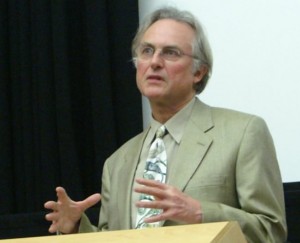 The Dawkins Delusion by Jasper C. Grobbleburp III– published by Twerp House Publishing Ltd 3/6; also Wacky Books Inc 1$
The Dawkins Delusion by Jasper C. Grobbleburp III– published by Twerp House Publishing Ltd 3/6; also Wacky Books Inc 1$
This splendid book brilliantly exposes the primitive myth of Richard Dawkins. Is is astonishing to reflect that in the 21st century millions of people worldwide actually believe that there is a man called Richard Dawkins. What we scientists more properly refer to as “the Richard Dawkins phenomenon” is a corporate delusion having its origins in our primitive, pre-scientific alchemical past. But if there really is no actual, physical Dawkins, how to account for the appearances – his constant emerging from laboratories and university science departments to come on TV and say such daft things? Over doughnuts and pints of creme de menthe, I put the question to Professor Grobbleburp.
“That’s easy,” he explained. “The so called Dawkins we all know and love is a projection of our collective subconscious desire to be told daft things.”
“You mean like when he says that reading fairy stories to children is ‘pernicious’?”
“Precisely. Though the Dawkins phenomenon says things even more stupid than that. For instance, he says that if God exists then we ought to be able to observe him through our telescopes.”
“What’s wrong with that – it’s scientific, isn’t it?”
“It’s actually most unscientific. Theology is the queen of the sciences and no theologian in history has ever said that God is a creature in the universe which God himself made.”
“But, Professor, the question must be asked, if Dawkins is only a collective delusion, why has this delusion persisted for so long? The silly sod seems to have been around jabbering his daft stuff for decades?”
“Good question. People believe in Dawkins because they want to believe in him. It’s a case of what the Freudians call “wish-fulfilment.” You see, the world is a serious place. We have to get up in the mornings and go out to earn our living. We are confronted each day with difficult moral choices. It’s only natural that we should want to offset this seriousness – life’s difficulties and trials – with a little nonsense. The Dawkins phenomenon provides that nonsense. Let me put this another way and say that Dawkins is the personification of nonsense. People will always believe in him – despite the best efforts of modern science – because his nonsense is such a comfort to us in what is, after all, a rather harsh world.”
“Let me ask you about something Dawkins – sorry, I mean the Dawkins phenomenon – said the other day. He said there’s no Santa Claus. he says he gave up believing in Santa Claus when he was a baby of twenty-one months.”
“Yes, I heard that too. The Dawkins phenomenon – as well as being a comfort to us – sometimes reveals this arrogant, know-it-all attitude. People find this offensive. It makes them say, ‘But I can’t believe in a Dawkins who is such a self-satisfied, bumptious ****!’ In particular, when he said those hurtful words about Santa Claus, Santa was very upset.”
“Thank you, Professor. And good luck with the book.”








Comments